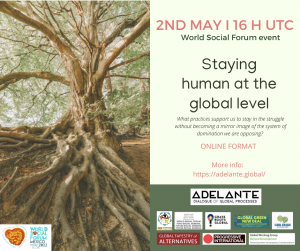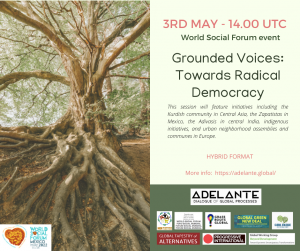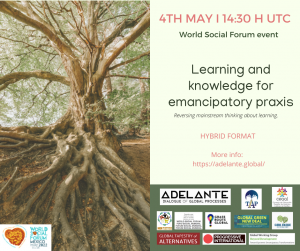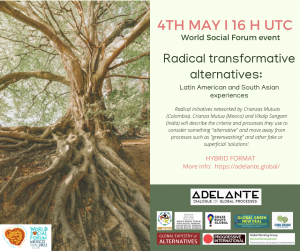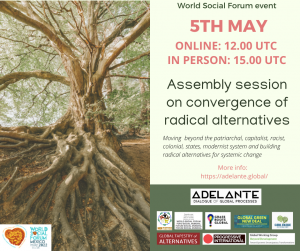ADELANTE in the WSF 2022
May 2nd
Staying human at the global level
- Time: 16:00 (UTC) / 11:00 (Mexico City)
- Duration: 90 minutes
- Languages: English
- Session WSF's page: https://join.wsforum.net/activities/10252
Beginning with an honest conversation between four people working in - and struggling with - the international level, and then opening out to include the others present, this session will look at the in-between spaces of 'the national, international or global' and ask: Given that international or global spaces are inherently coopted by the elite and given that we tend to learn that these spaces are more important than the real spaces we actually live in, what attitudes and practices support us to stay in the struggle without becoming a mirror image of the system of domination we are opposing? How do we reach out to connect our many places, our many struggles, so that we can collectively disentangle ourselves from systems of domination? How do we resist and subvert colonial cultural habits and assumptions when we're working in the more than local - and how do we tap into and create a new culture of connection in that space?
Speakers:
- 1. Eva Schonveld is an activist, writer and process designer/facilitator. She works on Grassroots to Global which exists to address the interconnected social and environmental threats that arise from dividing humans from the wider ecology, and from dividing our minds from our hearts, by connecting open-hearted listening and creative culture re-design with collective decision making processes that enable meaningful change.
- 2. Frédéric Vandenberghe is professor of sociology at the Federal University of Rio de Janeiro in Brazil where he also directs the Social Theory Lab Sociofilo. He has published widely on the history of ideas and various aspects of social theory in English, French and Portuguese. In English, he published A Philosophical History of German Sociology (2009), What’s Critical about Critical Realism? (2014) and co-authored with Alain Caillé For a New Classic Sociology (2021). He's part of the Anti-Utilitarian Movement in the Social Sciences and one of the chief editors of MAUSS International. He's a member of the Convivialist International and represents the Muliconvergence of Global Networks (MRG) at Adelante.
- 3. Justin Kenrick is an anthropologist, Quaker and activist who writes extensively, and campaigned for and helped shape Scotland’s Climate Citizens Assembly as part of Extinction Rebellion Scotland until XR had to leave. He co-founded Heartpolitics to help enable Grassroots to Global Assemblies, and works on community land rights in Africa for Forest Peoples Programme, and in Scotland where he chaired Action Porty through Scotland’s first successful urban community right to buy.
- 4. Vasna Ramasar is a researcher/teacher/learner at Lund University focused on the political ecology of sustainability from a decolonial and feminist perspective. As an activist, she is a core group member of the Global Tapestry of Alternatives, one of the coordinators the Adelante dialogue of global processes and a founding member of the Collective Against Environmental Racism in Denmark.As a South Africa with Indian heritage, living in Denmark and working in Sweden - the local and the global constantly intersect for Vasna but being grounded in the local, is something she recognises as taking a great deal of work.
May 3th
Grounded Voices: Towards Radical Democracy
- Time: 14:00 (UTC) / 9:00 (Mexico)
- Duration: 90 minutes
- Languages: English, Spanish
- Session WSF's page: https://join.wsforum.net/activities/10254
Across the world, 'democracy' has come to mean electoral politics and representative institutions of decision-making. Almost inevitably this leads to undemocratic tendencies like concentration of power in the hands of a few, and alienation between the 'rulers' and the 'ruled'. In contrast, peoples in many parts of the world are asserting that power is inherent in people and collectives. From this simple assertion flow processes where democracy is about decision-making focused first and foremost in local communities (rural and urban), empowerment of the most marginalised to be meaningfully part of such decision-making, self-determination for the most important aspects of life, and relative or absolute autonomy from centralised nation-states. This grounded form of politics (linked also to the democratisation of economies, social justice and equality, cultural and knowledge diversity, and ecological wisdom) is an antidote to the structures of oppression and unsustainability, including statism, patriarchy, capitalism, racism, and anthropocentrism.
This session will feature initiatives (some very old, some new) from various parts of the world, towards such radical democracy, including amongst the Kurdish community in central Asia, the Zapatista in Mexico, adivasis in central India, Indigenous peoples in other parts of the world, and urban neighbourhood assemblies and communes in Europe.
Panellists:
Elif Berk received her bachelor's degree from the Department of Political Science and International Relations at Bogazici University. She has been part of the Kurdish Women's Movement since her college years and worked in women's organizations. She has served on the board of the publishing committee of the Jineoloji Journal since 2015.
Xochitl Leyva-Solano is a worker of Social Sciences and an activist and a member of anti-systemic networks. Her theoretical/practical work is the expression of her experience accompanying women and young people in Indigenous Communities in resistance in Chiapas, Mexico and Abya Yala. Since June 2021 she has been a promoter and member of the collective initiative called “Al Faro Zapatista” (http://alfarozapatista.jkopkutik.org/).
Eva Schonveld is an activist, writer and process designer/facilitator. She works on Grassroots to Global which exists to address the interconnected social and environmental threats that arise from dividing humans from the wider ecology, and from dividing our minds from our hearts, by connecting open-hearted listening and creative culture re-design with collective decision making processes that enable meaningful change.
Leman Kiwan Hasano, Vice co-president of the Department of Economics in AlJazeera region of the Kurdish movement. A member at KongraStar, a women organization in Syria. An economics certificate from Damascus university. Worked in social work since 2012.
May 4th
Learning and Knowledge for emancipatory practice
- Time: 14:30 (UTC)/ 9:30 (Mexico)
- Duration: 90 minutes
- Languages: English, Spanish
- Session WSF's page: https://join.wsforum.net/activities/10257
- Location: Museo de la Ciudad
As we face the multiple crises of the current moment, knowledge is vital if we are to find our way towards a more sustainable world. To date, much of knowledge production has been in the hegemonic domain of narrow western academic institutions. This ignores the epistemes of knowledge that exist outside of modern science and narrows the idea of learning to what happens in formal classrooms. This session takes the starting point that learning and knowledge production can be diverse processes using a multiplicity of methods and learning spaces. In this session, we will introduce some of the different approaches and then have a deliberative discussion about how different types of learning & critical pedagogies and knowledge can be lifted to support emancipatory praxis. The session will focus more on the doing of such pedagogies and how we can learn and share with each other as we move out of the confines of mainstream thinking about learning. This session will feature reflections from The Alternatives Project (USA), Alternative (Canada), CEEAL (Mexico) and Adelante: Dialogue of Global Processes.
The format of this online session will be an introduction to the session followed by some reflections from groups that are working on alternatives to the hegemonic system. We will then open the space for a shared conversation on the topic, drawing from the experiences of everyone present in the session and are open to creative ideas for this sharing.
Speakers:
Steve Klees is Distinguished Scholar-Teacher and Professor of International Education Policy at the University of Maryland in the USA and is one of the founders of TAP, The Alternatives Project. He is a scholar-activist who has long been engaged with civil society and social movement struggles to combat the privatization of education and other social services, to further the right to education, and to challenge the policies of neoliberal institutions like the World Bank. He has published extensively, including being co-editor of the 2012 book The World Bank and Education: Critiques and Alternatives and author of the blog and recent book titled The Conscience of a Progressive.
Mario Gil Guzman is a popular educator and researcher of social movements and collective actions. He works at the Carrefour d'animation et de participation (CAPMO) in Quebec City. He is a member of Quebec Solidarity Movements, Member of the foundation EPAO Colombia and CEAAL Colombia. Mario has undergraduate studies in social sciences teaching, (Universidad Distrital de Bogota), Master in Sociology of Education at the University Laval of Quebec, Doctoral studies not completed at the University of Quebec in Montreal UQAM.
Ronald Cameron is a political and community activist retired from post-secondary education. He was president of the National Federation of Teachers of Quebec and director of the Institute of Cooperation for Adult Education. He is a member of the executive committee of the International Council for Adult Education. Holder of a master's degree in globalization and international development, he is still associated with Alternatives, of which he was the president. He was involved in anti-globalization movements for twenty years. He is one of the heads of the international solidarity commission at Québec solidaire.
Vasna Ramasar is an educator and researcher engaged with feminist and decolonial pedagogy. She works at Lund University in Sweden. Vasna is also engaged as a core group member of Global Tapestry of Alternatives and the Post-Development Academic Activist Group (PEDAGOG).
Radical transformative alternatives
- Time: 16:00 (UTC) / 11:00 h (Mexico)
- Duration: 90 minutes
- Languages: English, Spanish
- Session WSF's page: https://join.wsforum.net/?q=es/activities/10255
- Location: Museo de la Ciudad
Networks of radical alternative initiatives in Colombia, Mexico and India will describe the criteria and processes they use to consider something 'alternative'. In view of the attempts by nation-states and corporations to 'greenwash' themselves, it is crucial to be able to distinguish genuine alternatives from these. While the focus will be on these three regions, the dialogue would be relevant to the rest of the world too.
May 5th
Assembly session on convergence and Radical Alternatives
- Time:
- ONLINE: 12:00 (UTC) / 7:00 (Mexico)
- IN-PERSON: 15:00 (UTC)/ 10:00 (Mexico)
- Languages: English, Spanish
- Session WSF's page: https://join.wsforum.net/activities/10258
- Location: Please note the CHANGE OF VENUE. New venue: Palacio de Mineria, Calle de Tacuba 5.
In this moment of multiple crises, we see also an opportunity for convergence and confluence. Struggles must be united across different issues and resistance must go hand-in-hand with creating and sustaining the world we want to live in.
With this assembly we would like to bring together those interested in our overlapping struggles towards a more just and sustainable world, be they peace, climate, biodiversity, social justice, governance, or food. Movements are weakened when we are forced to dilute our energy across to many actions. We want to create a space of solidarity to plan collective action and visioning from local-to-global levels, both practical and conceptual, and grounded in place-based initiatives (of which there are thousands across the world). We also want to create a space to move beyond the partiarchal, capitalist, racist, colonial, modernist system and build radical alternatives for systemic change, focusing on autonomy and self-determination, radical interdependence, the commons and collective custudianship, socio-cultural diversity, open localisation, harmony with the rest of nature, and much else.
We invite friends at the World Social Forum, in-person and online to join us in sharing our stories of hope and inspiration, our worldviews and strategies for systemic transformation, our challenges while attempting these … and through all this, to develop actions for greater convergence of movements for radical transformative action.
Access to the draft manifesto that is open for comments and suggestions
